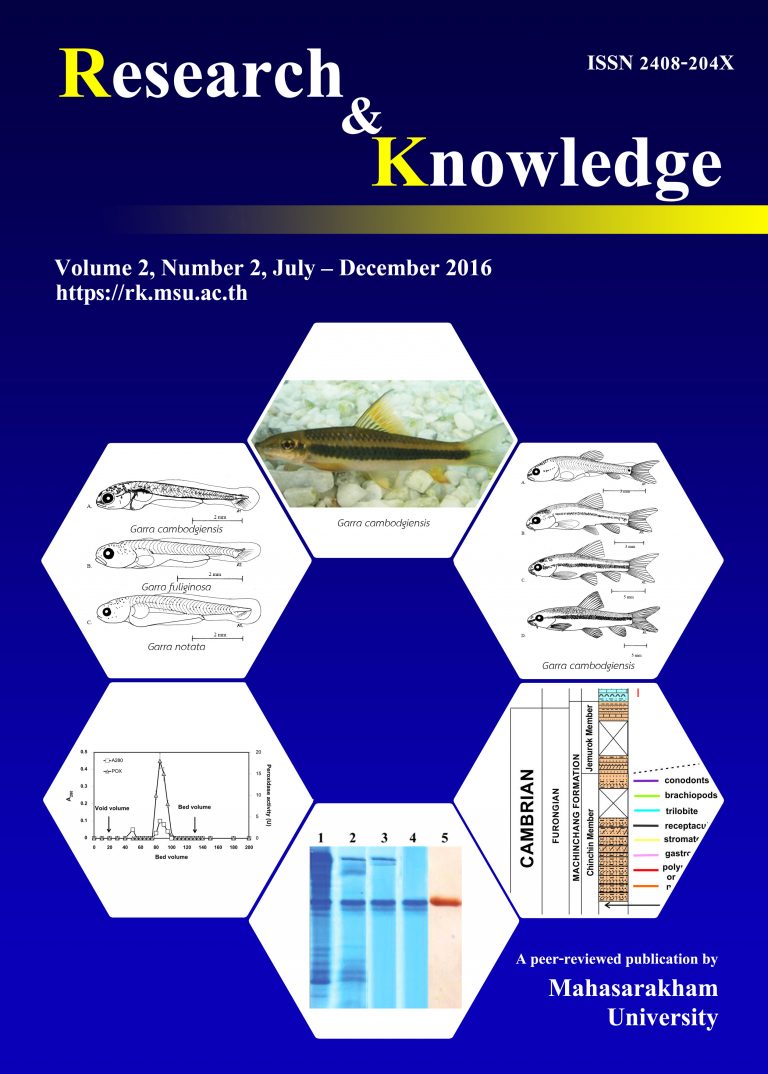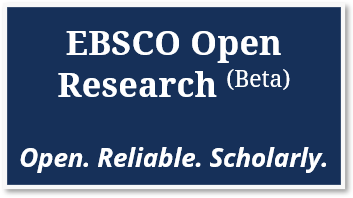Model of IQ, MQ, AQ and environmental education influencing conservation behavior
Keywords:
Model IQ, MQ, AQ, Environmental Education, Conservation Behavior, Inspiration of Public ConsciousnessAbstract
The objective was to propose a structural model of the Intelligence Quotient (IQ), Moral Quotient (MQ), Adversity Quotient (AQ) and Environmental Education (EE) that influences Conservation Behavior (CB) through Inspiration of Public Consciousness (IPC). The population was 35,450 undergraduate students of Mahasarakham University in the academic year of 2014. A multi-stage simple random sampling technique was employed to collect the sample for 400 undergraduate students. The research instrument was a questionnaire and it was used for data collection. LISREL was used for model verification. The results illustrated that IPC had the most effect on CB with an effect of 0.62 and the subsequences were EE, MQ, AQ and IQ with effects of 0.46, 0.38, 0.34 and 0.23, respectively. They were able to explain the variation of CB with 97.70 percent. Additionally, EE had the most effect on IPC with an effect of 0.46. Subsequences were AQ, MQ and IQ with effects of 0.32, 0.31 and 0.21, respectively. These were able to explain the variation of IPC with 93.00 percent.
References
Antony, F. 1979. “Golden rule”: A Dictionary of Philosophy. London: Pan Books in association with The MacMillan Press. Deary, I. J. and Batty, G. D. 2007. Cognitive epidemiology. Journal Epidemiology Community Health 61 (5), 378–384.
Devlin, B., Daniels, M. and Roeder, K. 1997. The heritability of IQ. Nature 388 (6641), 468–71.
Dickens, W. T. and Flynn, J. R. 2001. Heritability estimates versus large environmental effects: The IQ paradox resolved. Psychological Review 108 (2), 346–369.
Dickens, W. T. and Flynn, J. R. 2002. The IQ Paradox: Still Resolved. Psychological Review, 109 (4). Dictionary.com. 2010. Amorality. Retrieved 2010-06-18. “Having no moral standards, restraints, or principles; unaware of or indifferent to questions of right or wrong”.
Donkonchum, S., Thiengkamol, N. and Thiengkamol, C. 2012. Causal Relationship Model of Environmental Conservation Behavior Integrated with LCA Knowledge. European Journal of Social Sciences 33 (1), 5–13.
Duckworth, A. L. and Seligman, M. E. P. 2006. Self-discipline outdoes IQ in predicting academic performance of adolescents. Psychological Science 16(12), 939–944.
FAO. 2006. Deforestation causes global warming. Retrieved from http://www.fao.org/newsroom/en/ news/2006/1000385/index.html
Gonggool, D., Thiengkamol, N. and Thiengkamol, C. 2012. Development of Environmental Education Volunteer Model through Inspiration of Public Consciousness for Sustainable Development. European Journal of Social Sciences 32 (1), 150–160.
Johnson, W., Turkheimer, E., Gottesman, I. I. and Bouchard, T. J. Jr. 2009. Beyond Heritability: Twin Studies in Behavioral Research. Current Directions in Psychological Science 18 (4), 217–220.
Johnstone, M. J. 2008. Bioethics: A Nursing Perspective. Elsevier Health Sciences. pp. 102–103.
Koonboonchan, A. 2015.Model of EQ, AQ and Environmental Education Affecting Environmental Behavior. EAU Heritage Journal 9(2), 219–232.
Morrasri, P., Thiengkamol, N. and Thiengkamol, T. 2012. Causal Relationship Model of Little Green Child with Environmental Behavior. European Journal of Social Sciences 34 (2), 177–189.
National Research Council of USA. 2010. Advancing the Science of Climate Change. Washington, D.C. The National Academies Press. Neisser, U. 1997. Rising Scores on Intelligence Tests. American Scientist 85, 440–7.
Neisser, U., Boodoo, G., Bouchard, T. J. Jr., Boykin, A. W., Brody, N., Ceci, Stephen, J., Halpern, D. F. Loehlin, J. C. et al. 1996. Intelligence: Knowns and unknowns. American Psychologist 51 (2), 77–101.
Ruboon, O., Thiengkamol, N., Thiengkamol, T. and Kurokodt, J. 2012. Model of Environmental Education Teacher with Inspiration of Environmental Conservation for Global Warming Alleviation. European Journal of Social Sciences 31 (1), 92–102.
Peterson, C. and Seligman, M. E. P. 2004. Character Strengths and Virtues A Handbook and Classification. Washington, D.C. APA Press and Oxford University Press.
Seligman, M. E. P. 2002. Authentic Happiness: Using the New Positive Psychology to Realize Your Potential for Lasting Fulfillment. New York: Free Press.
Seligman, M. E. P. 2004. Character Strengths and Virtues: A Handbook and Classification. Washington, D. C. APA Press and Oxford University Press.
Stoltz, P. G. 1997. Adversity Quotient: Turning Obstacles into Opportunities. USA John Wiley and Son, Inc.
Superson, A. 2009. The Moral Skeptic. London: Oxford University Press. Thiengkamol, N. 2009a. The Great Philosopher: the Scientist only know but Intuitioner is Lord Buddha. Bangkok: Prachya Publication.
Thiengkamol, N. 2009b. The Happiness and the Genius can be Created before Born. Bangkok: Prachya Publication.
Thiengkamol, N. 2011a. Environment and Development Book 1, (4th ed.). Bangkok: Chulalongkorn University Press.
Thiengkamol, N. 2011b. Nurture Children to be Doctors. Bangkok: INTELLUALS.
Thiengkamol, N. 2011c. Development of Model of Envi - ronmental Education and Inspiration of Public Con - sciousness Influencing to Global Warming Allevia - tion. European Journal of Social Sciences 25 (4), 506–514.
Thiengkamol, N. 2012a. Model of Psychological Trait Influencing to Global Warming Alleviation Euro - pean Journal of Social Sciences 30 (3), 484–492.
Thiengkamol, N. 2012b. Model of Psychological Factors Influencing to Global Warming Alleviation. Interna - tional Proceedings of Economic Development and Research, 44, 6–12.
Thiengkamol, N. 2012c. Causal Relationship Model of Environmental Education. Mediterranean Journal of Social Sciences 3 (11), 11–18.
Thiengkamol, N. 2012d. Model of Environmental Educa - tion and Psychological Factors Influencing to Global Warming Alleviation. Mediterranean Journal of Social Sciences, 3 (11), 427–436.
Thiengkamol, N. 2013a. Causal Relationship Model of IQ and AQ influencing to Environmental Behavior. European Journal of Scientific Research 115 (2), 237–247.
Thiengkamol, N. 2013b. Causal Relationship Model of MQ and AQ influencing to Environmental Behavior. European Journal of Scientific Research 115 (2), 270–280.
Turkheimer, E. 2008. A Better Way to Use Twins for De - velopmental Research. LIFE Newsletter (Max Planck Institute for Human Development), 2–5.
United States National Academy of Sciences. 2008. Un - derstanding and Responding to Climate Change. Retrieved from http://americasclimatechoices.org/ climate_change_2008_final.pdf
Waewthaisong, S. Thiengkamol, N. and Thiengkamol, C. 2012. Causal Relation Model of Environmental Traveling Behavior. European Journal of Social Sci - ences 33 (1), 184–195.
Wiktionary. 2010. “Aamoral”. Retrieved 2010-09-09. “(of people) not believing in or caring for morality and immorality” World Commission on Environment and Development (WCED. 1987. Our Common Future. Oxford: Oxford University Press. The Brundtland Report. United NationsWorld Commission on Environment and Development. Retrieve from http://en.wikisource. org/wiki/Brundtland_Report
Downloads
Published
How to Cite
Issue
Section
License

This work is licensed under a Creative Commons Attribution-NoDerivatives 4.0 International License.









